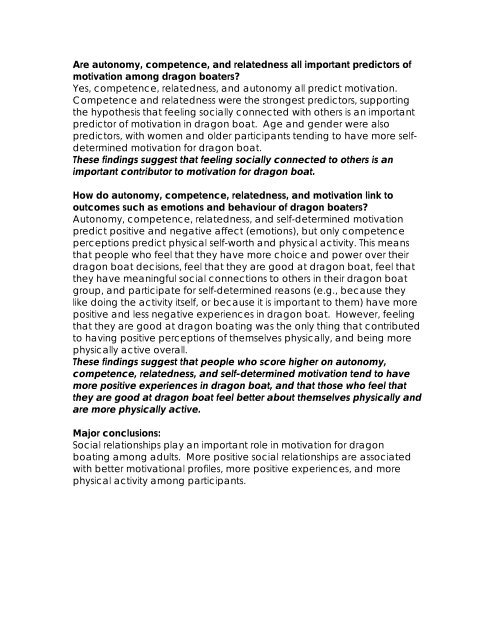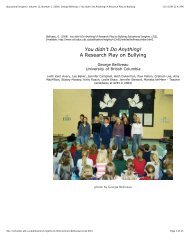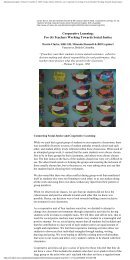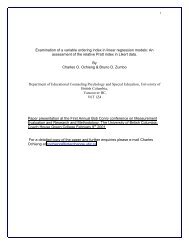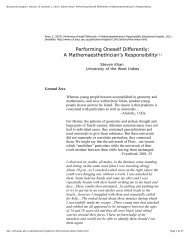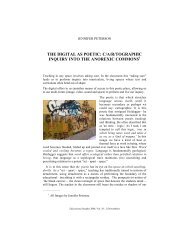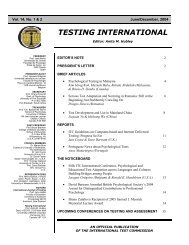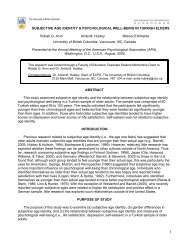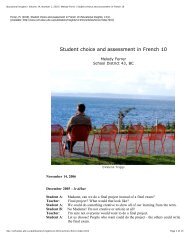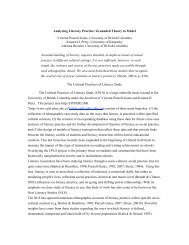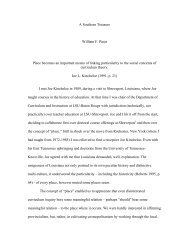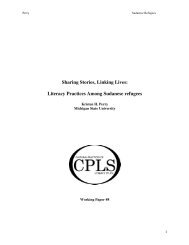The Role of Relatedness in Physical Activity Motivation, Behaviour ...
The Role of Relatedness in Physical Activity Motivation, Behaviour ...
The Role of Relatedness in Physical Activity Motivation, Behaviour ...
You also want an ePaper? Increase the reach of your titles
YUMPU automatically turns print PDFs into web optimized ePapers that Google loves.
Are autonomy, competence, and relatedness all important predictors <strong>of</strong><br />
motivation among dragon boaters?<br />
Yes, competence, relatedness, and autonomy all predict motivation.<br />
Competence and relatedness were the strongest predictors, support<strong>in</strong>g<br />
the hypothesis that feel<strong>in</strong>g socially connected with others is an important<br />
predictor <strong>of</strong> motivation <strong>in</strong> dragon boat. Age and gender were also<br />
predictors, with women and older participants tend<strong>in</strong>g to have more selfdeterm<strong>in</strong>ed<br />
motivation for dragon boat.<br />
<strong>The</strong>se f<strong>in</strong>d<strong>in</strong>gs suggest that feel<strong>in</strong>g socially connected to others is an<br />
important contributor to motivation for dragon boat.<br />
How do autonomy, competence, relatedness, and motivation l<strong>in</strong>k to<br />
outcomes such as emotions and behaviour <strong>of</strong> dragon boaters?<br />
Autonomy, competence, relatedness, and self-determ<strong>in</strong>ed motivation<br />
predict positive and negative affect (emotions), but only competence<br />
perceptions predict physical self-worth and physical activity. This means<br />
that people who feel that they have more choice and power over their<br />
dragon boat decisions, feel that they are good at dragon boat, feel that<br />
they have mean<strong>in</strong>gful social connections to others <strong>in</strong> their dragon boat<br />
group, and participate for self-determ<strong>in</strong>ed reasons (e.g., because they<br />
like do<strong>in</strong>g the activity itself, or because it is important to them) have more<br />
positive and less negative experiences <strong>in</strong> dragon boat. However, feel<strong>in</strong>g<br />
that they are good at dragon boat<strong>in</strong>g was the only th<strong>in</strong>g that contributed<br />
to hav<strong>in</strong>g positive perceptions <strong>of</strong> themselves physically, and be<strong>in</strong>g more<br />
physically active overall.<br />
<strong>The</strong>se f<strong>in</strong>d<strong>in</strong>gs suggest that people who score higher on autonomy,<br />
competence, relatedness, and self-determ<strong>in</strong>ed motivation tend to have<br />
more positive experiences <strong>in</strong> dragon boat, and that those who feel that<br />
they are good at dragon boat feel better about themselves physically and<br />
are more physically active.<br />
Major conclusions:<br />
Social relationships play an important role <strong>in</strong> motivation for dragon<br />
boat<strong>in</strong>g among adults. More positive social relationships are associated<br />
with better motivational pr<strong>of</strong>iles, more positive experiences, and more<br />
physical activity among participants.


